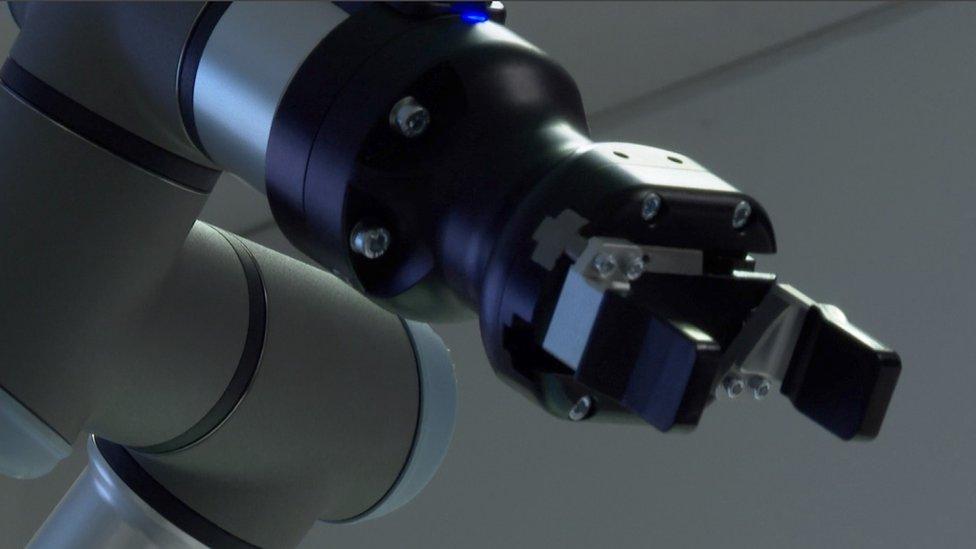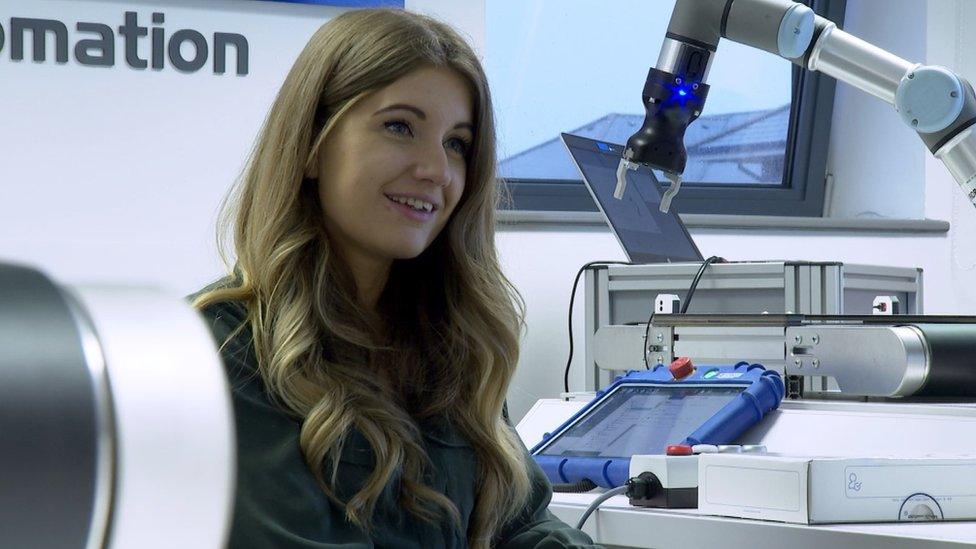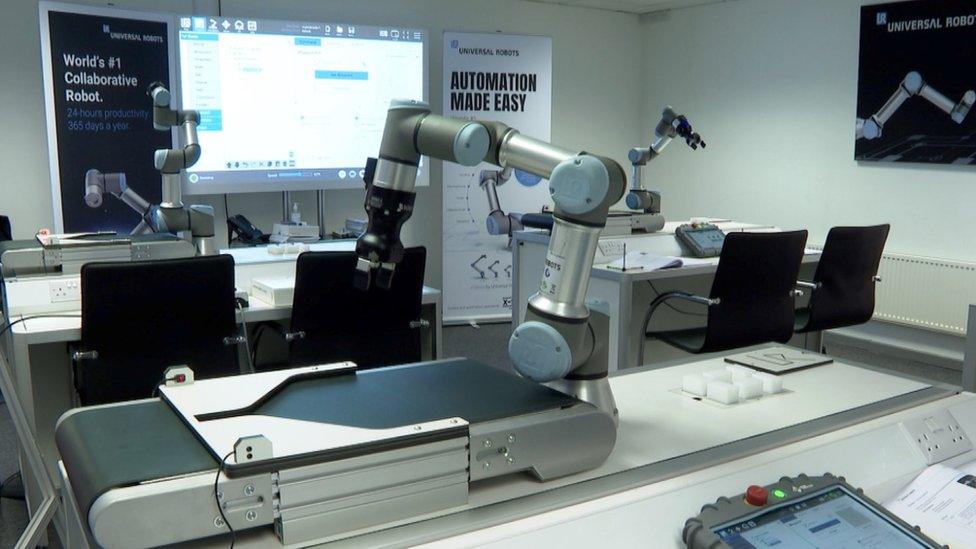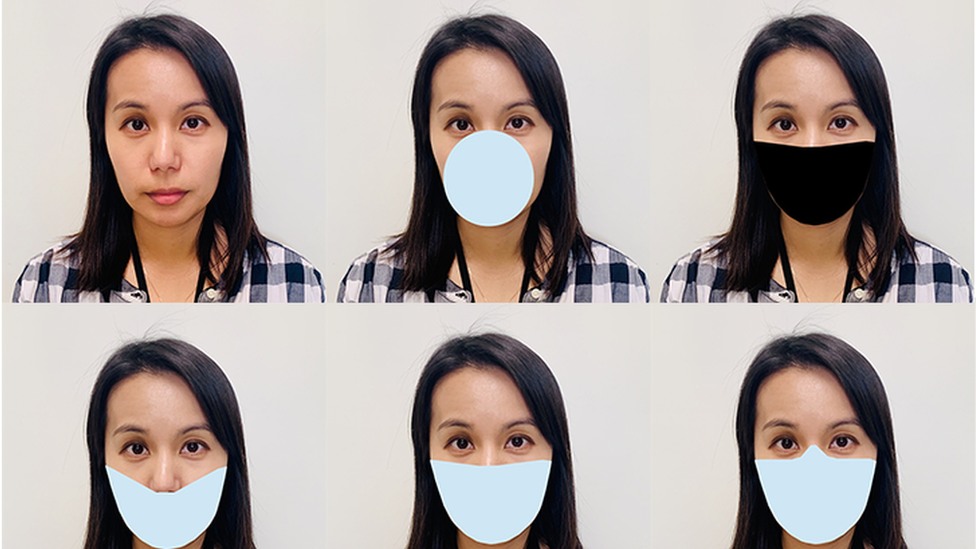Covid: 'Opportunity as well as threat' from pandemic tech advances
- Published

With lockdowns keeping workers out of the office, new technology has been used in many industries
Technological advances made during the pandemic are an "opportunity as well as a threat" to workers, an expert says.
The use of automation, robotics and artificial intelligence (AI) has grown by 30% since March 2020, according to industry body Technology Connected.
A report found this could harm the work prospects of lower paid staff, women, young people and minority groups.
But Cardiff University professor Phillip Brown said technology must be used to help shape a better future.
"We need to really get a better understanding of how technologies can be used in a way which is positive for the workforce, in a way which is positive for Wales," said Prof Brown.
He chaired an independent review into digital innovation, the economy and work for the Welsh Government.
"It's very difficult to make a judgement about where we are because of course lots of businesses are actually closed and not able to open.
"But I think basically we're not in a great position, and I think we really do need to get our act together."

Phillip Brown says the future could be difficult if we allow technology to "determine our fate"
"We've got to use that opportunity but we'll fail if we actually don't come together around government, business, unions and other stakeholders to really present Wales differently, and really see how can we shift the economy," he said.
"How can we move to create a better future of work for people. Because if we just allow the technologies to determine our fate we are in for a very difficult future."
X-STK is an automation company with offices in Cardiff that offers products and training in the use of "cobots", or collaborative robots.
These cobots are used in a range of industries, from pharmaceuticals to automotive and in universities.
The company has seen a major increase in demand for automation - with people not being able to go to work - to help with reduced numbers of staff and measures such as social distancing.
But does automation inevitably lead to people being replaced? Not according to Jessica Watts from the company.

Jessica Watts believes new technology could allow workers to focus on other roles
"Output increases, which means higher demand so those people that typically would have been doing the very repetitive, potentially dangerous jobs - you know with RSI [repetitive strain industry] and other things like that - actually, those people go on and be upskilled, and they've got more rewarding jobs, and they're doing things that have got more value," she explained.
Technology Connected said nearly 70% of all businesses questioned had increased their use of technology as a result of the pandemic and 48% said it had caused them to evaluate and speed up their adoption of new technology and working practices.
"Technology is totally ubiquitous and it's not just in industry," said managing director Avril Lewis.
"Who would have thought that we'd be connecting with our loved ones via, you know, Zoom calls or who would have thought that we would be visiting our doctor surgeries remotely, taking photographs on our phones and sending those through for diagnosis.
"Who'd have thought our children would be educated whilst online at home."

Many workplaces could look very different at the end of the pandemic
But with vaccines on the way, will the new reliance on technology continue when the option to "return to normal" is there?
"Do I see that going backwards? No, I only see that going forward and the pace at which it will progress will be entirely based upon how quickly new inventions, new innovations come to market," said Ms Lewis.
She said businesses and the industry would have to work to satisfy consumers who will now become "ever more demanding".
'Change is happening'
The Welsh Government said Covid had highlighted how much technology was changing lives.
"We recently launched our digital strategy for Wales which will be important in shaping how we effectively harness digital, data, technology and AI now and in the future for the benefit of people in Wales," said the deputy minister for the economy, Lee Waters.
"Change is happening at pace and we have a real opportunity to use the power of digital to improve our public services and create a culture of innovation and collaboration."
- Published18 April 2020

- Published2 November 2020

- Published4 December 2020

- Published15 December 2020
